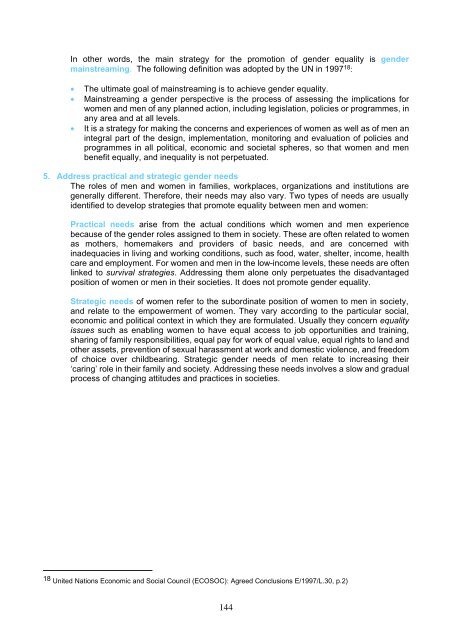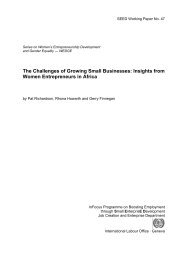manual: women workers' rights and gender equality - International ...
manual: women workers' rights and gender equality - International ...
manual: women workers' rights and gender equality - International ...
Create successful ePaper yourself
Turn your PDF publications into a flip-book with our unique Google optimized e-Paper software.
In other words, the main strategy for the promotion of <strong>gender</strong> <strong>equality</strong> is <strong>gender</strong><br />
mainstreaming. The following definition was adopted by the UN in 1997 18 :<br />
• The ultimate goal of mainstreaming is to achieve <strong>gender</strong> <strong>equality</strong>.<br />
• Mainstreaming a <strong>gender</strong> perspective is the process of assessing the implications for<br />
<strong>women</strong> <strong>and</strong> men of any planned action, including legislation, policies or programmes, in<br />
any area <strong>and</strong> at all levels.<br />
• It is a strategy for making the concerns <strong>and</strong> experiences of <strong>women</strong> as well as of men an<br />
integral part of the design, implementation, monitoring <strong>and</strong> evaluation of policies <strong>and</strong><br />
programmes in all political, economic <strong>and</strong> societal spheres, so that <strong>women</strong> <strong>and</strong> men<br />
benefit equally, <strong>and</strong> in<strong>equality</strong> is not perpetuated.<br />
5. Address practical <strong>and</strong> strategic <strong>gender</strong> needs<br />
The roles of men <strong>and</strong> <strong>women</strong> in families, workplaces, organizations <strong>and</strong> institutions are<br />
generally different. Therefore, their needs may also vary. Two types of needs are usually<br />
identified to develop strategies that promote <strong>equality</strong> between men <strong>and</strong> <strong>women</strong>:<br />
Practical needs arise from the actual conditions which <strong>women</strong> <strong>and</strong> men experience<br />
because of the <strong>gender</strong> roles assigned to them in society. These are often related to <strong>women</strong><br />
as mothers, homemakers <strong>and</strong> providers of basic needs, <strong>and</strong> are concerned with<br />
inadequacies in living <strong>and</strong> working conditions, such as food, water, shelter, income, health<br />
care <strong>and</strong> employment. For <strong>women</strong> <strong>and</strong> men in the low-income levels, these needs are often<br />
linked to survival strategies. Addressing them alone only perpetuates the disadvantaged<br />
position of <strong>women</strong> or men in their societies. It does not promote <strong>gender</strong> <strong>equality</strong>.<br />
Strategic needs of <strong>women</strong> refer to the subordinate position of <strong>women</strong> to men in society,<br />
<strong>and</strong> relate to the empowerment of <strong>women</strong>. They vary according to the particular social,<br />
economic <strong>and</strong> political context in which they are formulated. Usually they concern <strong>equality</strong><br />
issues such as enabling <strong>women</strong> to have equal access to job opportunities <strong>and</strong> training,<br />
sharing of family responsibilities, equal pay for work of equal value, equal <strong>rights</strong> to l<strong>and</strong> <strong>and</strong><br />
other assets, prevention of sexual harassment at work <strong>and</strong> domestic violence, <strong>and</strong> freedom<br />
of choice over childbearing. Strategic <strong>gender</strong> needs of men relate to increasing their<br />
‘caring’ role in their family <strong>and</strong> society. Addressing these needs involves a slow <strong>and</strong> gradual<br />
process of changing attitudes <strong>and</strong> practices in societies.<br />
18 United Nations Economic <strong>and</strong> Social Council (ECOSOC): Agreed Conclusions E/1997/L.30, p.2)<br />
144

















